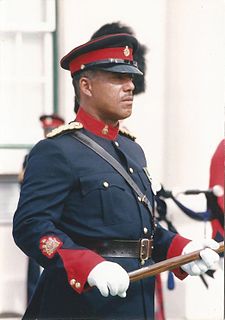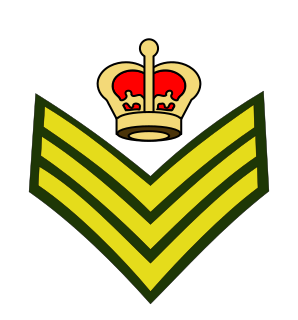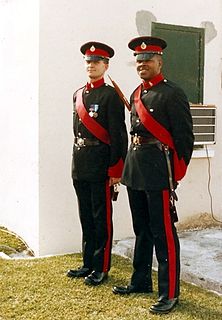
Warrant officer (WO) is a rank or category of ranks in the armed forces of many countries. Depending on the country, service, or historical context, warrant officers are sometimes classified as the most junior of the commissioned ranks, the most senior of the non-commissioned officer (NCO) ranks, or in a separate category of their own. Warrant officer ranks are especially prominent in the militaries of Commonwealth nations and the United States.
Regimental sergeant major (RSM) is an appointment that may be held by warrant officers class 1 (WO1) in the British Army, the British Royal Marines and in the armies of many Commonwealth and former Commonwealth nations, including Australia, Kenya and New Zealand. It is also an appointment that may be held by chief warrant officers (CWO) in the Canadian Forces and warrant officers of any grade in the Singapore Armed Forces, and is a rank in itself in the Irish Defence Forces and formerly in the British Army, Royal Marines and United States Army. Only one warrant officer holds the appointment of RSM in a regiment or battalion, making him the senior warrant officer; in a unit with more than one WO1, the RSM is considered to be "first amongst equals". The RSM is primarily responsible for assisting their commander for maintaining standards and discipline amongst the non-commissioned members and acts as a parental figure to their subordinates.
Sergeant major is a senior non-commissioned rank or appointment in many militaries around the world. In Commonwealth countries, the various degrees of sergeant major are appointments held by warrant officers. In the United States, there are also various grades of sergeant major, all of the same pay grade of E-9; however, the Sergeant Major of the Army and the Sergeant Major of the Marine Corps, as their respective service's Senior Enlisted Advisor, receive a special rate of basic pay that is higher than all other sergeants major.

Colour sergeant or color sergeant is a rank of non-commissioned officer found in several armies and marine corps.

A garrison sergeant major (GSM) in the British Army is the senior warrant officer of a garrison and holds the rank of warrant officer class 1. The GSM London District, always a guardsman, holds one of the four most senior WO1 appointments in the British Army, and has military ceremonial responsibility for important state occasions such as Trooping the Colour.
The academy sergeant major is the senior non-commissioned officer instructor at a military academy.
Chief warrant officer is a military rank used by the United States Armed Forces, the Canadian Armed Forces, the Pakistan Air Force, the Israel Defense Forces, the South African National Defence Force, the Lebanese Armed Forces and, since 2012, the Singapore Armed Forces. In the United States Armed Forces, chief warrant officers are commissioned officers, not non-commissioned officers (NCOs) like in other NATO forces.

"Other ranks" is the term used to refer to all ranks below officers in the British Army and the Royal Marines. It includes warrant officers, non-commissioned officers ("NCOs") and ordinary soldiers with the rank of private or regimental equivalent. Officers may, in speaking, distinguish themselves from those "in the ranks".
Staff sergeant major is an appointment in some Commonwealth armies and also a rank in the Royal Canadian Mounted Police.

The company sergeant major (CSM) is the senior non-commissioned soldier of a company in the armies of many Commonwealth countries, responsible for administration, standards and discipline. In combat, his prime responsibility is the supply of ammunition to the company. He also oversees the distribution of other supplies, such as water or food, although that responsibility is mainly that of the company quartermaster sergeant (CQMS), and evacuating the wounded and collecting prisoners of war.
A troop sergeant major (TSM) is the senior non-commissioned officer in a Royal Artillery troop of the British Army, usually holding the rank of warrant officer class 2. This differs from a cavalry troop or infantry platoon, in which the highest-ranking non-commissioned officer (NCO) is usually a sergeant.
The term used in the Royal Air Force (RAF) to refer to all ranks below commissioned officer level is other ranks (ORs). It includes warrant officers (WOs), non-commissioned officers (NCOs) and airmen.
Like the British Army, the Australian Army does not use the term 'enlisted' to describe its non-commissioned ranks. Instead, personnel who are not commissioned officers are referred to as other ranks. These are soldiers, non-commissioned officers (NCOs) and warrant officers (WOs). Warrant officers are appointed by a warrant which is signed by the Chief of the Army. The insignia for non-commissioned ranks are identical to the British Army up to the rank of warrant officer class two. Since 1976, WO1s and the WO in the Australian Army wear insignia using the Australian Coat of Arms.

A bandmaster is the leader and conductor of a band, usually a concert band, military band, brass band or a marching band.
Quartermaster sergeant (QMS) is a class of rank or appointment in some armed forces, especially those of the United Kingdom and the Commonwealth, and formerly also in the United States.
Artificer sergeant major (ASM) is a senior warrant officer appointment in the technical branches of the British and Australian Armies.

A warrant officer (WO) in the British Armed Forces is a member of the highest group of non-commissioned ranks, holding the Queen's warrant, which is signed by the Secretary of State for Defence. Warrant officers are not saluted, because they do not hold the Queen's Commission, but they are addressed as "Sir" or "Ma'am" by subordinates. Commissioned officers may address warrant officers either by their appointment or as "Mister", "Mrs" or "Ms", and then their last name, e.g. "Mr Smith". Although often referred to along with non-commissioned officers (NCOs), they are not NCOs, but members of a separate group, although all have been promoted from NCO rank.

The Corps Regimental Sergeant Major is the most senior warrant officer of the Royal Marines. Responsible for maintaining standards and discipline within the Royal Marines, they act as a parental figure to their subordinates and also to junior officers, even though the latter technically outrank the RSM.

The Army Sergeant Major is the most senior member of the other ranks of the British Army. The three appointment holders have actually been commissioned officers holding the rank of captain, although uniform and insignia similar to that of a warrant officer class 1 is worn while holding the appointment. The appointment was created as part of the changes to the British Army's top ranks around February 2015. The ASM sits on the Executive Committee of the Army Board (ECAB) and works with the Secretary of State for Defence, top civil servants and other high-ranking members to shape British Army policy. The first appointment was made in March 2015.








